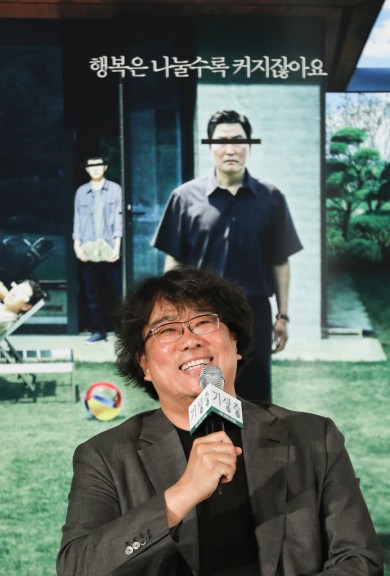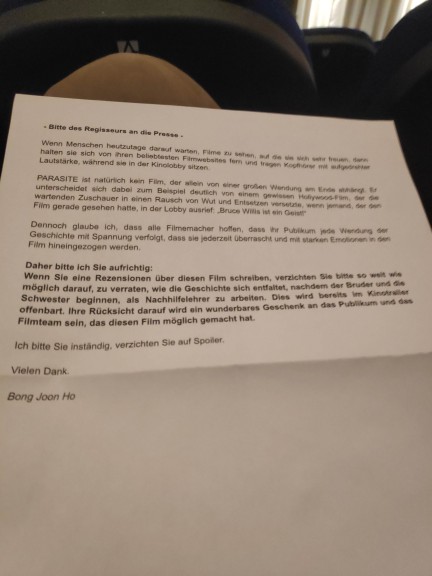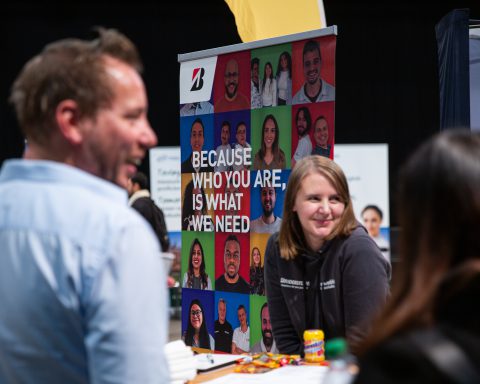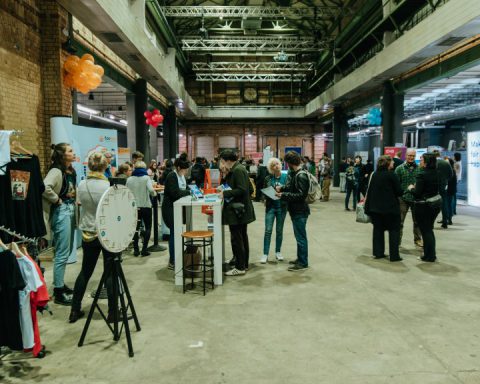What does it mean to work for someone? Are you a subordinate? An acquaintance? A help? Figuring out the boundaries and privileges of such a relationship is as elusive and ever-shifting as any friendship or romantic connection might be. Only the dynamic is inherently different. One party can always decide to end the relationship while the other will always be dependent on its continued existence. The ramifications of these relations and the room between the vastly different ways to interpret and shape the employer-employee relationship is the canvas on which Parasite paints, with its dizzying array of colors and brushes.
The newest film by South Korea’s unicorn-like genre filmmaker Bong Joon-Ho, Parasite is wildly entertaining.
For a film that seems to have so much to tell, on both a narrative and a thematic level, it feels like a privilege and a blessing that it is also such a blast to watch. Because the way in which Parasite unfolds is a unique achievement in and of itself.

On its surface, the film – the first South Korean one to have nabbed the Palme d’Or at Cannes – is a family drama. It details the lower-class struggle of a four-person family whose employment and daily life is in constant flux. Their family dynamic is refreshingly eclectic. You can never tell who really has the most say within this tightly-knit group.
Father Kim Ki-taek, played Song Kang-Ho – most of South Korea’s favorite actor – is not just equal to mother Kim Chung-sook, played by Jang Hye-jin (who gained 30 pounds for her role as the former pro-hammer-thrower matron). They both also seem to handle their offspring as equals without concerning themselves much with in-fighting or any power dynamics.
United by their awareness of the ever-present, looming threats of homelessness, reliance on government aid or total loss of existence, they also shed a lot of the familiar banalities and squabbles of middle-class family life.
In a brilliant little touch of universal modernity, their first on-screen struggle is to find a new WiFi network to use after their neighbors changed their password.
Sitting atop a confusingly high toilet seat at the edge of their flat, the college-age offspring of the family, Ki-jung and Ki-woo, hold their phones in just the right angle to receive one or two bars of signal from the new cafe’s WiFi. They clearly have not done this for the first time. They also all appreciate it as if they know it won’t be the last time either. The family dynamic conveys an intimate knowledge of financial struggle without feeling didactic or patronizing towards the characters.
This family is not outwardly desperate or angry. Rather, they seem wearily aware of the challenges that come with daily financial hardship and the necessity to be creative in their own ways to get by.
So when son Ki-woo gets contacted by his friend to take over private tuition duties for an upper-class pupil, the wheels begin to turn for the whole family. I’m going to follow director Bong’s own recommendations, printed on paper and handed to all attendees of the screening, and refrain from revealing any further plot developments. The film is indeed, as Bong instructs, best enjoyed without any more knowledge about its narrative.
The imagery in Parasite, the beauty in its precision, and knowing, comedic irreverence towards late capitalism, feel like a breath of fresh air amid other “important Films” with a capital F – which mainly want to be important and forget to be entertaining.

Parasite manages to thoroughly entertain and delight in its nimble staging and agile pace. However, it also brims with sociopolitical commentary through various filmic metaphors. It is both a cinematic blast and a high-brow head scratcher; a popcorn flick and thesis on South Korea’s rapidly growing socioeconomic divide. It’s the movie you should not miss this fall. Not only because it will keep audiences from all walks of life engaged for all these reasons.
Parasite will have an exclusive preview screening next week, opening this year’s Filmkunstmesse Leipzig, one full month before the German release. Find out about its two public screenings as well as all the other cinematic gems playing at the 1. Kinotage Leipzig during Filmkunstmesse in our OmU Movie Showtimes.









